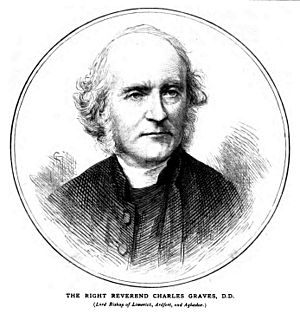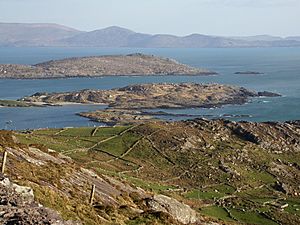Charles Graves (bishop) facts for kids
Charles Graves (born December 6, 1812 – died July 17, 1899) was an important Irish person. He was a talented mathematician, a university professor, and later a church leader. He taught mathematics at Trinity College Dublin and was also the president of the Royal Irish Academy. He served as a dean at Dublin Castle and eventually became a Bishop in the Church of Ireland. Charles was also the brother of two other famous people: John Graves, who was a lawyer and mathematician, and Robert Perceval Graves, a writer and clergyman.
Contents
Early Life and Education
Charles Graves was born in Dublin, Ireland. His father, John Crosbie Graves, was a police chief in Dublin. Charles went to Trinity College Dublin, a famous university. In 1832, he was chosen as a "Scholar" for his excellent work in classics. In 1834, he graduated as a top student in mathematics.
While at Trinity, Charles played cricket. Later in life, he enjoyed boating and fly-fishing. He also helped start the Dublin University Choral Society, a singing group. Charles was very good at fencing and horse riding. He was even planning to join the army, following his uncle, Major-General James William Graves.
A Career in Mathematics and the Church
Charles Graves became a fellow at Trinity College in 1836. In 1843, he was named the Erasmus Smith's Professor of Mathematics. He held this important teaching job until 1862.
He wrote more than 30 mathematical papers. Some of these were published after he left his university job to become a clergyman. For example, he wrote about "Binomial Coefficients" and "Focal Circles of Plane and Spherical Conics." His work was well-respected by other mathematicians.
After leaving Trinity College, Charles followed in his family's footsteps and joined the church. In 1860, he became the Dean of the Chapel Royal in Dublin. From 1864 to 1866, he was the dean of Clonfert. Then, he became the Bishop of Limerick, Ardfert and Aghadoe. He served as a bishop for 33 years until he passed away.
Charles was also very active in academic groups. He joined the Royal Irish Academy in 1837 and was its president from 1861 to 1866. He was also elected a Fellow of the Royal Society in 1880, which is a great honor for scientists. He received an honorary degree from Oxford University in 1881.
Charles Graves was known as a kind and smart person. He was very respected as the Bishop of Limerick. He even had a good friendship with the Catholic Bishop, O'Dwyer. They would tell jokes and discuss scholarly topics together, showing that they could be friends despite their different religious roles.
Discovering Ancient Irish History
Charles Graves was very interested in old Irish history and culture. He made an important discovery: he found the key to understanding the ancient Irish Ogham script. This script was found carved on old stone monuments called Cromlechs.
He also encouraged the government to publish the old Irish laws, known as the Brehon Laws. His idea was accepted, and he became the secretary of the Brehon Law Commission. This group was set up to publish these ancient laws.
The commission hired two scholars, Eugene O'Curry and John O'Donovan, to translate the documents. They used a special printing method called anastatic lithography to make copies of the original old texts. This allowed many copies to be made and sent to major libraries. Charles Graves wrote reports to the government about how the commission was using this new technique.
Private Life and Family
Charles Graves' official home was "The Palace" in Limerick. But he also had a summer home called "Parknasilla House" in County Kerry. In 1894, he sold this house to Great Southern Hotels, which still owns it today.
In 1840, Charles Graves married Selina Cheyne. They had a large family. Some of their children became well-known:
- Alfred Perceval Graves (1846–1931) was a poet.
- Arnold Felix Graves (1847–1930) helped start what is now the Dublin Institute of Technology.
- Charles Larcom Graves (1856–1944) was a writer and critic.
- Sir Robert Wyndham Graves (1858–1934) was a diplomat.
- Ida Margaret Graves Poore was also a writer.
Charles Graves was also the grandfather of famous people like Robert Graves, a well-known poet and writer.
|
 | Bayard Rustin |
 | Jeannette Carter |
 | Jeremiah A. Brown |



